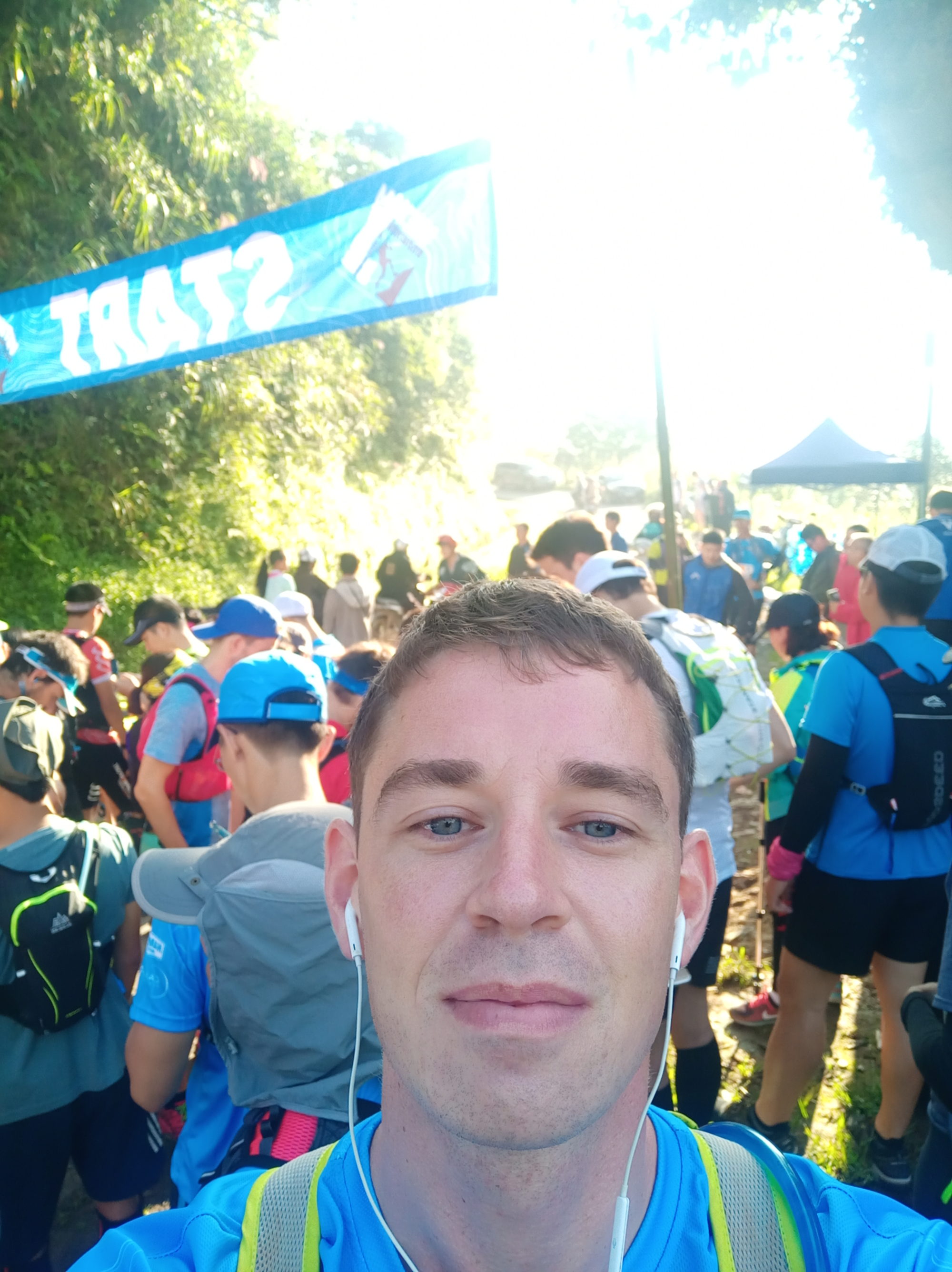
“I run because if I didn’t, I’d be sluggish and glum and spend too much time on the couch. I run to breathe the fresh air. I run to explore. I run to escape the ordinary. I run…to savor the trip along the way. Life becomes a little more vibrant, a little more intense. I like that.”
– Dean Karnazes, Ultramarathon Man: Confessions of an All-Night Runner
I don’t feel any better when I cross the finish line. I’m exhausted, in every sense of the word. Mentally, physically, everything else. My head a vacuum.
It’s a little after half past 2 and I’ve been struggling through the Vietnamese sun for the last few hours. Cramped. Dehydrated. I’m not sure if I’ve eaten too much or too little. Probably too little, though my stomach can’t tell the difference right then. Too something anyway.
There are others running too, of course, but I’m not too concerned about them right now. I feel alone in the mass of people waiting at the finish line, supporting, cheering, recovering, some celebrating and somehow feasting and drinking.
I’ve just run and walked more than 42 kilometres, up, down and through the mountains of SaPa, Vietnam, as an entrant in the annual Vietnam Mountain Marathon, part of the Vietnam Trail Series.
Starting at 7:30 in the morning with a few hundred others, we a gentle uphill jog took us from 1,600 metres above sea level, we quickly climbed to over 2,300m within a few kilometres. The real lunatics were already well underway at that point, having taken it upon themselves to complete 70 or 100km distances.
By the time I’d finished, over 7 hours later, I’d ascended 2,000 metres of vertical elevation and descended even more. Many entrants walked the trail, an ordeal in its own right, taking up to 15 hours – a full day’s walk and climb.
I feel no sense of achievement as I collapse on the grass just past the finish line. There’s no joy, no congratulations, certainly no runner’s high. My stomach is starved with hunger and dehydrated, yet don’t have it in me to eat or drink. I’m tired but I can’t rest or sit still. I don’t feel like celebrating or doing anything. I am truly exhausted.
I am dead.
Why was I here?
I’d always been a big fan of travelling by walking; that is to say, walking was my preferred way to get around on my holidays. This love had existed as far back as I can remember, when as young kids my father used to take us to hike the hills and mountains back home in the west of Ireland. Or, it might have come from my inability to afford a car in my twenties.
However it came about, I do believe there’s a lot to be said for travelling on foot.
You see more. It’s slower. It’s safer. It’s the least removed and most personal form of navigation. With every step you take up the food chain of transport technology – to bicycle to motorbike to car to bus to airplane – you sacrifice intimacy for speed.
Trains are different, they sit separately out on their own – although they’re removed and by definition on rails and unable to deviate from their itinerary, there’s a certain beauty and respect for tradition and etiquette inherent in travelling by train. In this way even the train to Westport is a marvellous thing.
On foot, you are up closest to the things you are looking for. You move at your own speed, even within a group, and are free to stop and pause and turn your attention as you wish, down to the smallest turn of the head or focus of your eyes. Your senses are more attuned and you can hear more; you hear bird songs and snippets of conversations and yes, even traffic. You move slowly and what you lack in breadth of ground covered you make up for by giving your full and undivided attention to that which you do see and come across. Quality over quantity. It’s often the difference between going into a shop to buy and just window shopping; between actually going through a town or just taking the bypass.
That’s when you walk.
A few years ago I’d decided to run, as conventional wisdom would have it that the exercise is good for you. Like many people I’d always hated it, not seeing the point in running unless it was after a ball, or having grown up on a farm, a stray calf. The treadmill was an option except for it seemed like the definition of hell, or at least purgatory; running around the leafy Dublin suburbs I was living in at the time made it easier.
There was fresh air and there were things to look at.
Once I was able to cover a couple of blocks and return home not entirely exhausted, somewhat alert and not only not hating life but actively seeking it out, I realised that I was travelling in a sense, exploring my neighbourhood and beyond.
With fitness I was able to extend my loop out to Bushy Park and back into Rathmines through Rathgar, through areas just a bit too far to justify a walk after work and still be home at a reasonable hour. I was covering a gentle cycling distance, but with the added closeness of being on foot. And the convenience of not having to get a bike.
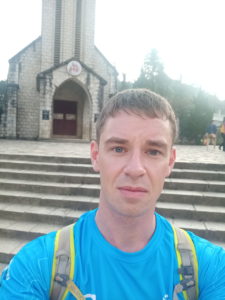
Soon I was being dragged out the door by the anticipation of what I might see around me: passing traffic, shops and pubs and other premises; homes and churches and their gardens.
Crossing over a bridge and seeing how it interacts with the river flowing beneath and through the park. Not just running through the forest as a means to up my fitness but for its own sake, to be surrounded by the lawns and the woods, the odd live animal or dead suburban leaves on the wet tarmac.
I learned what a runner’s high was, coming home and feeling not just satisfied but happy, not tired but energised and focused. This high extended to the runs too and not just the well-earned aftermath – all the wonders of nature and the city being experienced in a state of heightened awareness.
One day I was actually excited to get home from work to run. I had it all visualised ahead of time, putting on my runners and going out the door before I could change my mind or even have something to eat.
That’s it: You’re fucked now.
Hooked.
The start of a run is the hardest, mentally. The last part is inevitably the toughest, physically. If there is a distinction between the mind and the body, and I’m not sure there is, that’s how it feels anyway.
But there’s a wonderful space in the middle, once the body is warmed up and the sweat has started to come. You’ve started to feel the first feelings of tiredness and overcome them – mind sharpened.
Your limbs and muscles are warmed up, you’ve worked up a nice sweat and the first splatters of mud and dirt have spurted forth, all over your shoes and up your back. Your body is warmed up.
And in between the mentally tough beginning and the physical tough finish is where your meant to be – enduring both at once, neither mind nor body separate from the other.
All of this adds to a wonderful feeling – freedom.
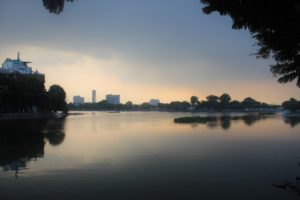
And what better thing to do with freedom than travel?
I realised my next move as I swerved my Honda Win through Sunday morning traffic on the way home from the Hanoi Half Marathon, where I’d been living for a couple of years. The freedom of travel by motorbike had been one of the best things about moving here. The freedom to go to the shops when you like; the freedom not to have to run to catch the last bus home; the freedom to take off into the mountains and the jungles and get lost for a while.
I’d just run 21km. I’d surpassed any goals I had for the day, in terms of finishing time but also in my enjoyment of the race. I loved it. I’d only recently started training longer distances but something struck me then: I could do more, go further, keep enjoying running. Keep travelling, on foot.
And so I signed up for the Vietnam Mountain Marathon in SaPa.
When I moved to Vietnam, I continued my new love of running in the less-than-ideal running environment of Hanoi. I’d swapped those leafy suburbs of Dublin for the smoggy and traffic-congested suburbs of Vietnam’s capital.
Running in Hanoi was often a pain in the arse and ill-advised, but I still sought it out. The pollution was bad but it didn’t bother me as much as others. The heat, also not a feature of life in Mayo, was worse for me. Just walking to the end of the narrow alleyway to buy water was work.
Sweat pouring out of you and filling your clothes like a rag in a Molotov cocktail.
And these were no streets to run on. The traffic in the city is a tourist attraction in its own right, and many people are amazed or terrified by the constant whizz of bikes passing by. There are few footpaths; the ones that exist are occupied with all manner of vendors and their various stalls and stools. Even once acclimatised to the heat, the streets of Hanoi were no place to navigate on foot, much less run. It’s actually safer to travel by bike.
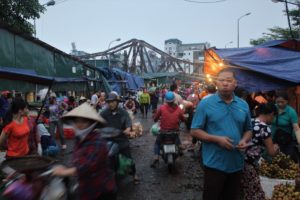
I had always felt like I was riding my luck to an extent, vying for footpath space, and often not getting it, with local vendors, dogs, pedestrians and evening exercisers necessitating regular ducks onto the road and often on-coming traffic. The single reliable rule of the road in Vietnam is “Don’t hit anyone else,” and I relied on others’ adherence to this rule probably more often than I should have. Often times there were dangerously unlit sections of road, or part of the pavement would be dug up for seemingly no reason, or bits of metal and concrete and debris lay strewn around a place that had once been used for a spot of work or repair.
Sometimes sections of road would be dug up, presumably by civil authorities or contractors for repair, and presumably a case of ‘not my job’ when the hole in the tarmac was left there with debris strewn around once the repairs were finished. Whether officially sanctioned or through the quick-thinking by an inventive and safety-conscious neighbour, the means of warning against constructional hazards was often comical.
One day I was returning home on Dang Thai Mai Street and had to swerve to avoid a large square segment of tarmac that had been removed and left so; thankfully later on someone had thoughtfully left a waist-high shrub in the offending hole – nobody would try to drive straight through a shrub. It must have worked because a couple of days later a second shrub filled another absent square of tarmac just a few metres down the road, presumably due to the conscientiousness – or perhaps financial incentivisation – of one of the many horticultural businesses that lined the road near the gaps in civil engineering.
Other times gaping wounds in the tarmac would be left exposed; not to worry as traffic will readily veer around to avoid a shoe placed in front of the manhole, or a shirt or a stack of cardboard boxes.
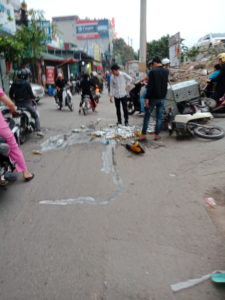
But I put up with all of this, seeing such obstacles as occupational hazards, and running continued to grow and grow on me in spite of this really being the worst place in the world for someone to run. Pollution, heat and traffic are three of the worst environmental features for a runner, and Hanoi has all of them in abundance.
Just as in Ireland I’d grown to love exploring the nature of my neighbourhood and beyond, seeing running as a wonderful means to travel once I’d built up a small bit of fitness, so too did running around and through and in front of all the wonders of as vibrant a city as Hanoi proved to be. For rather than just clocking up mileage and arbitrary level of ‘fitness’, I was getting to see the charms of the city up close.
Hanoi is the most ‘alive’ city I’ve ever been to, with the most exciting and captivating of everyday human activity. The preferred method of transport here, the motorised bicycle, is a brilliant way to travel the Vietnamese (or any) countryside, having the pace of a car but the immersion of not being constricted by a wall of metal and glass. But in a city, walking pace is preferable, especially when the vibrating chaos of the masses of scooters around you are constantly keeping your senses in high alert and focused (hopefully) on the road ahead.
And so I acclimatised to the toxic conditions of my adopted city and found new ways of seeing it by running through, around and over its various obstacles. Recreational running, like cycling or any other pointless activity for its own sake, is an affluent person’s sport, and in a developing city like Hanoi the sight of anyone running was met with amusement and bemusement by many. But the Vietnamese practice of pointing and laughing at different ways of doing things was endearing, and I took it as human inspiration for what is, to an extent, a pointless exercise.
Running on the traffic-thronged road, ducking under wires, leaping over bricks upturned from the footpath; dodging past toddling children playing unsupervised in the middle of the street while their parents worked somewhere nearby; darting around crowds of workers enjoying late-night beers on tiny stools on the side of the road; all of these were potential hazards to avoid, but also the sights and parts of the city which travellers flock from all over the world to see.
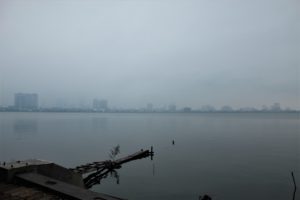
Hanoi has no Eiffel Tower, no Empire State Building. Although the Old Quarter is the attraction for most tourists on their stopovers between less hectic and better promoted destinations such as Ha Long Bay, Sa Pa and Ninh Binh in the north, every street in the city is alive with its most arresting sight and attraction: its people.
People working, people walking (and even some crazy people running), kids playing, people eating, drinking, talking, meeting neighbours, going for a perambulation around the block. Old people, young people. Youngsters on the way to school with their parents on the way to work. Drivers delivering impossible loads which dumbfound even to this day, somehow packing up ridiculous hauls of eggs or beer or building materials and balancing them delicately on the back of a small scooter, and equally impossibly managing to navigate this traffic, and getting it to its destination in one piece, and on time, and somehow managing to navigate this traffic, and what is this guy doing running in amongst all of it?
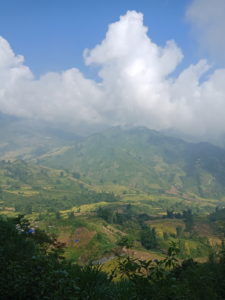
[This is what I came here for. Ironically, you don’t stop and gaze off into the valleys that much during a race; but you do get the odd glimpse, and your focus on the incredible terrain underfoot is razor-sharp. You absorb much more than your brain recalls.]
I run because I’m told it’s good for me; and because with experience I learned that it definitely is good for me. But whatever about the long-or-short-term benefits of it – it is what it is. If you put one foot in front of the other for an extended period of time, you get around. If you go far enough, you’ll see new things. As well as long-distance running being a personal journey, it’s also just a journey.
Which is how I ended up in Sapa, at the finish-line, dead.
Sapa is a town in the Lao Cai region in the very north of Vietnam. It’s exploded with tourism in the last decade and is one of the ‘go-to’ destinations of Vietnam for foreign tourists and Vietnamese alike. It’s defined by its mountains, with their steep terraced rice fields dazzling visitors with their improbability; reflective of the hardiness and traditional resourcefulness of its many indigenous tribes: the H’Mong, the Tay and the Dao.
It’s popular because it has everything a traveller to Asia might want: stunning world-class scenery; native cultures still living a centuries-old existence; easy transport access from the capital city with ample travel information and tour-booking facilities online.
I signed up for this race in some sort of optimistic and possibly half-mad ambition to seek out travel by running to the extreme. Deciding that a better goal than trying to beat others would be just to run for enjoyment, and a few uphill struggles would be worth the natural thrill of getting out of the city and travelling in the mountains again.
I spent almost three years living in Hanoi; working, travelling, living. You can do all three just by going to work as a teacher in a Vietnamese school every day. And like they say, the new experiences of travel transform you.
And here I’d found a new way to learn about and explore this country I’d grown to love.
Ironically, I hadn’t taken that much time to stop and check out the views along the way.
When I fell over the finish line I couldn’t think straight; I couldn’t think at all. I felt like I’d been turned inside out. I felt no sense of accomplishment; no joy at finishing, certainly no runner’s high.
I was dead.
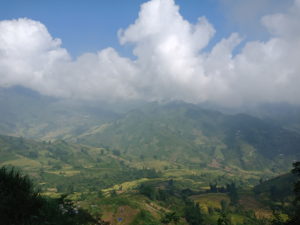
[More of the gorgeous Lao Cai valleys. The weather was perfect for sightseeing; less-so for racing as temperatures rose to 30 degrees by mid-day]
In the days after I recovered, and in the weeks after I got back to ‘normal’. I didn’t feel ‘different’ for having done the race – if anyone asked I’d have said that change might have come in the many hours of training leading up to it.
But in hindsight, there have been changes, certainly from that time period if not from doing the marathon itself, or from running alone.
I’ve been more disciplined, I’ve had more purpose and have been more positive.
My mind has been clearer and calmer.
It might have been the running, it might have been the travelling.
It was probably both.
“Struggling and suffering are the essence of a life worth living. If you’re not pushing yourself beyond the comfort zone, if you’re not demanding more from yourself – expanding and learning as you go – you’re choosing a numb existence. You’re denying yourself an extraordinary trip.”
Dean Karnazes – again. Not just a prolific runner, he is also prolific at the inspirational quotes.
My goal for the marathon was to ‘get fit enough to enjoy the whole thing.’ I literally used the word ‘frolic’ in planning the race and visualising my day.
I half met that goal, getting my first cramps at the 25km mark and suffering immensely throughout the final quarter.
But I’d felt the freedom of travel, in some of the most stunning terrain I’ve yet seen in the world. The sharp and improbable rice terraces; the resourceful and impenetrable locals going about their routines, amused and bemused by invading runners, many of them pointing and laughing.
And once warmed up, once the heart-rate rises and runners get dirty and sweat pours through you and your shirt. Once things get difficult, that’s when your senses start to fire and you really come alive.
Until I got worn out, until I died.
At the finish line I had no thoughts, no emotions. No joy, no sense of achievement, but also no sadness. It was like my mind had been painlessly removed; sieved out my ears and blown off into the gorgeous mountains and valleys of Lao Cai.
All those views I’d seen and passed I couldn’t recall, but I’d absorbed in ways I wouldn’t know for weeks or even months.
After I recovered and regrouped and got back to the real world, I was a different person.
Maybe that’s what this exhaustion of emotion was.
I wasn’t dead.
I was free.
1 Comment